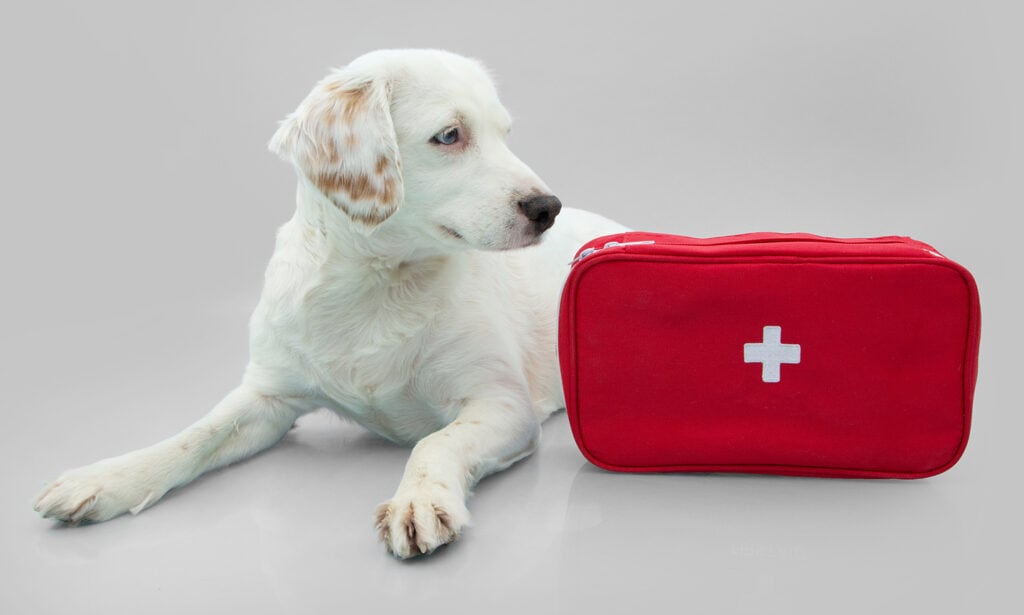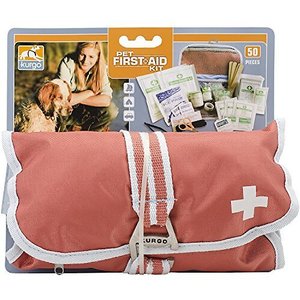As pet parents, we want our fur babies to be healthy and happy 24/7. Unfortunately, though, our pets may face a few emergency situations over the course of their lives that require quick medical attention. Knowing basic first aid and CPR can make all the difference.
We got the 411 from two vets on first aid for dogs and cats, including how to handle common injuries and how to put together a pet first aid kit.
How To Handle Common Injuries in Dogs and Cats
“I recommend that pet parents have a plan for common injuries,” says Alexa O’Daniel, DVM, an emergency veterinarian at VEG Boynton Beach in Boynton Beach, Florida.
While you can begin treatment for many common injuries at home, Dr. O’Daniel says it’s essential to take your pet for veterinary care to ensure they’re receiving all the treatment they need.
For common injuries, Amy Attas, VMD, founder of City Pets Vets in Manhattan, New York, offers the following tips to administer at-home first aid for dogs or first aid for cats before heading to the vet.
Bleeding
“Bleeding injuries should be dealt with immediately, especially if there is profuse bleeding,” says Dr. Attas. She recommends taking these steps:
- First, remember that your pet may be experiencing pain in the injured area, so be careful. “Even a gentle, loving dog will bite when they are scared and in pain,” she says.
- Using gauze, a clean cloth, or a clean paper towel, apply firm pressure to the area that’s bleeding. Maintain firm pressure because it takes time for blood to clot.
- If you cannot control the bleeding or the bleeding is excessive, you should get your pet to the vet as quickly as possible.
Cuts, Scrapes, and Abrasions
- Wash the area with cool, slightly soapy water. Do not use warm or hot water; doing so can cause more bleeding because it dilates blood vessels. It may be useful to keep pet wipes on hand to clean wounds.
- Rinse well.
- Apply gentle pressure.
- Do not apply human OTC products unless directed to do so by your veterinarian as some can contain ingredients toxic to dogs. However, applying a pet-safe wound spray may be useful.
Insect Bites and Stings
- If your cat or dog suffered a bee sting and the stinger remains, remove it with tweezers. Don’t use your fingers to remove it, as this may push the stinger in farther.
- Assess your pet for an allergic reaction. (More on that below.)
Allergic Reactions
If your pet is having an allergic reaction, they may experience hives, which will likely cause them to scratch, and swelling, which can become dangerous because it can affect their airway and cause difficulty breathing.
- You may be able to give your pet an over-the-counter oral antihistamine, such as Benadryl® (diphenhydramine). Consult your veterinarian before giving your pet Benadryl® (or any other medication). Your vet can assist with appropriate dosage amounts and provide guidance on managing your pet’s symptoms.
- Follow up with a vet—quickly in the case of excessive swelling due to the danger of airway obstruction.
Poisoning
Common sources of poison to dogs and cats include cleaning products, human medication, rat poison, and other chemicals, says Dr. Attas, and she cautions that it can be a life-threatening situation if your pet ingests poison.
Always keep the phone number for the Pet Poison Helpline® (PPH)—855-764-7661—in a convenient location. Here’s what to do if your pet ingests poison:
- Call the PPH and give them your pet’s details—including sex, breed, age, and weight—and tell them which toxic substance and how much of it your pet ingested.
- The PPH can decide about the danger your cat or dog faces, tell you what you should begin doing at home, and offer info you can give to the veterinary hospital when you arrive, says Dr. Attas.
Hyperthermia (Heatstroke)
“Hyperthermia describes the emergency where the dog or cat’s body temperature gets too high from extreme activity or extremely hot weather,” says Dr. Attas. Prolonged elevated body temperatures can lead to serious organ injury and be life-threatening.
Heatstroke is a medical emergency, and cold water and ice water baths can further harm your pet and should never be given.
If you believe your pet could have heatstroke, take them to an animal hospital as soon as possible.
Other Possible Emergencies
For other emergency situations, such as snake bites or broken bones in dogs and cats, head straight to the pet emergency room for immediate veterinary care.
Your pet needs a vet’s expertise. Do not try to splint a broken bone yourself or treat a snake bite on your own.
Considerations for Outdoor Cats
According to Dr. Attas, it’s worth noting that if you have an outdoor cat, they are more at risk for injuries than if they lived indoors. For example, they’re more likely to get into an altercation with another cat, be bitten or scratched, and end up with an infection.
Being free to wander and explore, outdoor cats are also exposed to more toxins, such as poisonous plants and chemicals used for pest control.
Overall, knowing first aid for cats is equally important for those kitties who live outdoors as it is for those who live indoors.
First Aid Kit for Dogs
It’s always wise to have the essentials on hand. Your dog’s first aid kit should contain the following, which includes suggestions from both Dr. O’Daniel and Dr. Attas:
- Sterile gauze pads
- Bandaging material for dressing wounds
- Antiseptic wipes containing chlorhexidine for cleaning wounds
- Wound ointment for cuts and scrapes
- Benadryl® (diphenhydramine) for allergic reactions
- Cloth for compression of bleeding
- Eye wash to flush foreign bodies or debris from the eyes
- A digital thermometer
- Tweezers for removing thorns from your dog’s paws or stingers left by bees
- A recovery collar in your dog’s size so they won’t lick or bite at an injury
- Gloves
- Styptic powder
- A leash
- A water bowl
First Aid Kit for Cats
A cat’s first aid kit should contain the following items:
- Sterile gauze pads
- Bandaging material for dressing wounds
- Antiseptic wipes containing chlorhexidine for cleaning wounds
- Feline wound care spray
- Cloth for compression of bleeding
- Eye wash to flush foreign bodies or debris from eyes
- A digital thermometer
- Tweezers for removing bee stingers from body or thorns from paws
- A recovery collar in your cat’s size so they won’t lick or bite at an injury
- Gloves
- Styptic powder
- A water bowl
Share:





















